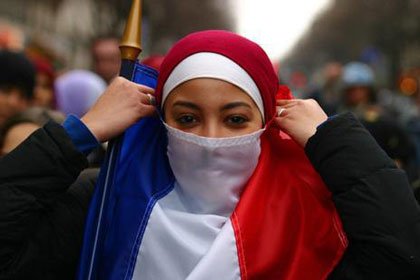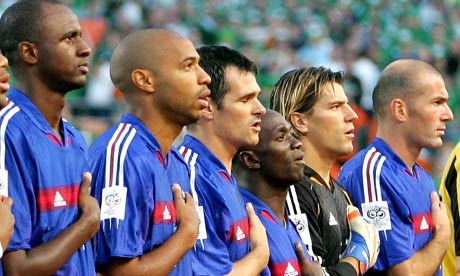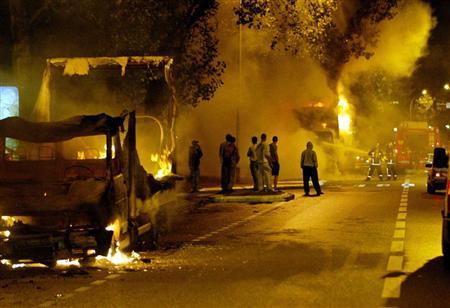Toward a new French identity
The marginalisation of immigrant populations in France has left many without hope for change. Is the election of Socialist François Hollande as President a chance for resolution?
Although a run-down on France’s colonialist past is no small task, the root of current unrest is fundamentally a crisis of identity. France has two conflicting ideas of itself: la France Traditionelle, and the France of today.
The Dichotomy of France Today
In the words of past President Charles de Gaulle in 1959, La France traditionelle is seen as people of Anglo-Saxon, Greek and Latin descent, possessing Christian faith¹. This face cherishes valeurs anciennes: its traditions, food, wine, and way of life that have existed since the time of the Gauls.
On the other hand, there is France as it really exists today: a mix of ethnic backgrounds and religions. There is an increasing number of people of Tunisian, Moroccan and Algerian descent, with Islam as the second most practiced religion. This is the ‘new’ France: an ethnically varied population with diverse religious beliefs, cuisines, lifestyles, and modes of dress.
The French Attitude
“France: either you love it or you leave it,” stated former President Nicolas Sarkozy in April 2006.² This is remarkably reflective of how France has adopted an expectation of assimilation towards its immigrant populations. This includes discarding outward displays of religion, particularly the Islamic headscarf or the burqa.
It is significant to note that whilst signs of Islamic faith such as wearing the burqa have been outlawed, crosses and other Catholic religious symbols have not received the same treatment.
The hijab has been banned in public schools on the grounds that as state-run institutions they are secular, according to the principle of la laïcité in the French Constitution. However, public schools still acknowledge Catholic holidays, whilst they ignore Islamic religious days. Indeed, many claim that Sarkozy leveraged this French fear of les beurs (Arabs) or Muslims to his advantage in attempt to be re-elected as President in 2012.
A Marginalised Demographic
Much of this immigrant population has been crammed into housing estates in les banlieus, often deprived of public services and discriminated against by employers, leading to widespread unemployment.
This discrimination has lead to a deep sense of frustration, particularly amongst young people. Many of them are second or third generation French, who, whilst they have been born and raised in France, are still not acknowledged as ‘real’ Français. This frustration has manifested in sporadic suburban violence, seen in the riots of November 2005.
The issue is that these concepts of identity clash on a fundamental level: one holds on to traditional ideals and practices, while the other shows the changing face of French society.
Hope for change?
In the aftermath of the social riots of 2005, Former President Chirac made a speech urging for acknowledgement of the diversity of the French population, and pleading for an evolution of ‘spirit’.³ However, with Nicolas Sarkozy pushing for anti-immigration methods and the upholding of France’s secular traditions for the past five years, it remains to be seen if this evolution of attitudes will occur.
With Socialist François Hollande taking over the role of President, we may finally see the changes in perspective that many marginalised French have for so long awaited.
Will France’s long-held traditions of égalité and fraternité lie to waste in paternal ambition? Can those on the fringes hope for a brighter future?
_______
1. Le Général De Gaulle disait il y a exactement 50 ans, ce que tout le monde feint de découvrir soudain, on Magazine Terredisrael.com, 05/03/2012
2. France’s Immigration Politics, Patrice de Beer on Open Democracy, 12/02/2012
3. Jacques Chira: la justice sera sans faiblesse, on Maghress, 14/11/2005
_______
Image Credits:
1. Burqa Ban, on Worn Through
2. The French Football team, on the Guardian
3. French suburbs, on Reuters










France has kept its cultural identity through centuries of immigration. It has been slightly influence by these waves of immigration. Why should it be different now? This article is inaccurate in many points and follow a negative tendency which says that France should adapt to the immigrants. Ask Italian, Spanish, Portuguese or Polish immigrants if they’ve received as much as North African do receive when they come to France?
Peut-être, parmi tous les pays européens (surtout ceux qu’on estime de culture latine: l’Espagne; l’Italie; le Portugal, etc.)qui avaient été convertis à la chrétienneté, c’est la France qui s’est montrée la plus séculaire.
Mais, du même titre, je n’arrive pas à comprendre pourquoi la France, qui avait réussi à établir une séparation de la religion et les affaires gouvernementales de l’État, s’agrippe à la bonne vieille chrétienneté sous l’étendard de laquelle elle a réagi contre l’Islam et ses accoutrements tels la burqa.
Tout compte fait, quasiment partout dans le monde, c’est l’atrocité, la plaie purulente de la religion qui a gaché l’esprit humain, qui nous a empêché d’évoluer.
Qu’il s’agisse de la chrétienneté ou de l’Islam, tout se résume en un seul concept étouffant: “Mon Ami imaginaire l’emporte sur le Tien”.
My French Life™ encourages diversity, as a community and as a magazine. This is a very complex issue which we are discussing. This author has started to explore the issue from the perspective of an Australian francophile who has spent time living in France. All views expressed are those of the author/s.
We are seeking others to share their views. Please contact us if you would like to provide an article as a guest post or as a regular contributor. All articles <600 words to be sent to info@MyFrenchLife.org with information about yourself.
Many thanks
Judy
FONDATRICE
My French Life™
http://www.MyFrenchLife.org
L’article de Katja reflète ce que des australiens ont l’habitude de me dire au sujet de la France.
Il serait intéressant de comprendre d’où vient cette vision ? Les médias ?
It’s important to explain that, Emmanuelle!
I think that while the Australian perspective may have been partially formed by the media, it’s mainly a very complex combination of cultural factors.
Australia is a very young country – perhaps only 150-250 years old at best.
It’s also worth remembering that we gained our independence passively – We’ve never really fought for the fundamental basis of our society.
Much of Australia’s identity has been constructed around large waves of immigration – from Europeans following WW2, and people from the continent of Africa, and the Middle East more recently.
We also have no extreme right or left in politics – our only experience with that has been the very xenophobic One Nation party.
Lastly, although it may not appear to foreigners, we have a lot of inherent racism here. This being said, a large number of Australians are very liberal and accepting. The majority would be happy to let more asylum seekers in to the country, but the government refuses. Thus, we are quick to label this stance as ‘racist’.This issue of ‘asylum’ itself makes our own perceptions of immigration very different.
It’s all of is and so much more! Just as the French perspective can’t be contained to 500 words, ours can’t either.
Of course! This is a very complex issue, with many sides to it, which could not be covered in under 600 words. This is merely one side of the issue, and is far from a comprehensive analysis of France’s society today. There is much to be said for the other side of the debate, including many wonderful initiatives such as Touche pas a Mon Pote. Many countries in Europe, and indeed all over the world face similar social movements and polemiques. However, as France is the focus of this magazine…!
I would really love to have someone address the other side of the issue, and all the movements at the moment that are embracing France’s evolving demographic and the dynamic, diverse society that is the result.
Hannah,
J’avoue être coupable d’encore un détour du sujet original. Je vous prie de me pardonner. Cependant, je ne suis pas complètement d’accord avec tout ce que vous avez écrit.
Si, en affirmant que l’Australie est un pays jeune, vous ne parlez que de l’âge de la société dite ‘européen’, établie par les différents peuples qui ont débarqué ici en 1788 (car il faut le dire, ceux-ci ne sont pas venus uniquement d’Europe; le nombre de nationalités représentées à bord des vaisseux de la Première Flotille était au moins 23, donc, lors de leur arrivée, on était déjà multiculturels)alors, oui, notre société non-Aborigène est relativement ‘jeune’.
En outre, ne disons pas que l’extémisme raciste n’a surgi qu’avec le parti de P. Hanson. Après l’arrivée de la Première Flotille, plusieurs nouveaux immigrés n’ont pas hésité à exterminer de nombreux Aborigènes, leurs actions bénies et soutenues par une croyance malsaine à la “terra nullius”, le refus de reconnaitre les millénies de culture aborigène.
Katja, I agree with the two last parts of your article. Especially the fact that there is still a lot of injustice and discrimination towards many French because they are immigrants’ sons. Also the fact that too many times the Christian cross is allowed in schools whereas the burqa is not. All of this is unfair and many French have a right to be angry and go on riots.
Although, it seems to me you can’t sum up such a big and painful issue by just saying: there is a dichotomy in France. As a French, I don’t consider myself as a part of the ‘France traditionnelle’ you describe, just because I’m not part of the ‘ethnic France’. It’s as if you would say: someone is either black or white.
Even though both of my parents are French, I have met people from other countries, I feel attracted by other ways to live, probably like you do. I am not the product of my culture and my past only, there are others components: my personality, my tastes, my experiences. So there’s no way you can split the French people in two: the ‘traditionnels’ and the ‘ethniques’. It’s as if I asked you: ‘Do you consider yourself as the descendant of the first settlers in Australia OR do you have indigenous blood?’. What would you answer?
Also, it seems fair to me that when you live in a country, you have to abide by the law. In France we consider that someone who wears a niqab in a public place is a potential danger. You can’t see the person at all, so it can seem like a threat. This has nothing to do with religion, it is safety. So Nicolas Sarkozy’s statement doesn’t seem so absurd to me. I feel like you are mixing up many things, with no real conclusion.
Fitz – c’est vrai! I didn’t have a chance to mention in my long-winded comment that we are also very culpable when it comes to persecuting our own indigenous population. The White Australia policy was only abolished in the 1970’s!
Most Australians don’t know how to address the problem, and avoid the issue altogether. C’est dommage!